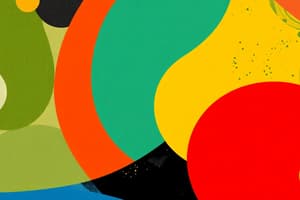Podcast
Questions and Answers
What does imagery aim to evoke for the reader?
What does imagery aim to evoke for the reader?
- Abstract thoughts
- Logical reasoning
- Historical context
- Sensory experiences (correct)
What literary device involves the attribution of human qualities to non-human entities?
What literary device involves the attribution of human qualities to non-human entities?
- Symbolism
- Imagery
- Metaphor
- Personification (correct)
Which literary analysis component involves analyzing themes, motifs, and symbols?
Which literary analysis component involves analyzing themes, motifs, and symbols?
- Identifying the author's purpose
- Exploring broader historical context
- Analyzing the use of literary devices (correct)
- Examining the text's structure
How does literature promote critical thinking in students?
How does literature promote critical thinking in students?
Why is literature considered essential in English Language Arts?
Why is literature considered essential in English Language Arts?
Flashcards are hidden until you start studying
Study Notes
English Language Arts: Exploring Literature
In the realm of education, English Language Arts (ELA) encompasses a wide range of subjects, but today we'll delve specifically into the wonderful world of literature. This genre spans various forms of writing, offering captivating stories, thought-provoking ideas, and rich language experiences.
Definition of Literature
Literature is a vast umbrella term that includes a multitude of written works, such as novels, short stories, poetry, plays, and nonfiction text. The key aspect of literature is its ability to evoke emotions, explore themes, and engage readers through the art of storytelling.
Forms of Literature
There are four major subcategories within the literature realm:
- Poetry: A form of literature that uses language to evoke emotions, create images, and express ideas through rhythm, rhyme, and tone.
- Fiction: Tales that involve imagined characters, events, and settings, often with a focus on plot and narrative structure.
- Nonfiction: Non-fictional accounts that aim to inform, educate, and present facts as they actually occurred or are discovered.
- Drama: A form of literature written specifically for performance, typically on stage, and intended to entertain, provoke thought, and engage the audience through dialogue, conflict, and plot.
Literary Devices
Literature uses a variety of literary devices to create meaning, evoke emotion, and engage readers. Some of these devices include:
- Symbolism: The use of objects, characters, or actions to represent abstract ideas or concepts.
- Metaphor: A figure of speech in which a word or phrase is applied to an object or action to which it is not literally applicable, often to create a vivid image or to make a concept more understandable.
- Imagery: The use of vivid and concrete language to evoke sensory experiences for the reader.
- Alliteration: The repetition of the same initial consonant sound in multiple words in close proximity to each other, often used to create emphasis or to make the text more memorable.
- Personification: The attribution of human qualities, behavior, and abilities to non-human entities, such as animals, inanimate objects, ideas, or abstract concepts.
Literary Analysis
A key part of studying literature is learning how to analyze texts critically. Literary analysis involves breaking down a text to identify its components, themes, and techniques. An effective literary analysis should:
- Identify the text's central idea and the author's purpose.
- Examine the text's structure, tone, and style.
- Explore the text's themes, motifs, and symbols.
- Analyze the text's use of literary devices.
- Consider the text's broader historical, cultural, and social context.
The Importance of Literature in English Language Arts
Literature is an essential component of English Language Arts because it:
- Enhances reading comprehension by exposing students to a variety of writing styles, genres, and content.
- Develops critical thinking and problem-solving skills by challenging students to analyze texts and identify themes, motifs, and symbols.
- Promotes a deeper understanding of language, including its use, structure, and meaning.
- Cultivates empathy and emotional intelligence by exposing students to diverse perspectives and experiences.
In conclusion, literature offers a rich and diverse landscape to explore, learn, and grow. By studying literature, students can develop critical thinking, language, and emotional intelligence skills that will serve them well in their academic, personal, and professional lives.
Studying That Suits You
Use AI to generate personalized quizzes and flashcards to suit your learning preferences.




